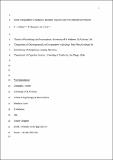Social manipulation in nonhuman primates: cognitive and motivational determinants
Abstract
Social interactions are the result of individuals’ cooperative and competitive tendencies expressed over an extended period of time. Although social manipulation, i.e., using another individual to achieve one’s own goals, is a crucial aspect of social interactions, there has been no comprehensive attempt to differentiate its various types and to map its cognitive and motivational determinants. For this purpose, we survey in this article the experimental literature on social interactions in nonhuman primates. We take social manipulation, illustrated by a case study with orangutans (Pongo abelii), as our starting point and move in two directions. First, we will focus on a flexibility / sociality axis that includes technical problem solving, social tool-use and communication. Second, we will focus on a motivational/prosociality axis that includes exploitation, cooperation, and helping. Combined, the two axes offer a way to capture a broad range of social interactions performed by human and nonhuman primates.
Citation
Voelter , C J , Rossano , F & Call , J 2017 , ' Social manipulation in nonhuman primates: cognitive and motivational determinants ' , Neuroscience and Biobehavioral Reviews , vol. 82 , pp. 76-94 . https://doi.org/10.1016/j.neubiorev.2016.09.008
Publication
Neuroscience and Biobehavioral Reviews
Status
Peer reviewed
ISSN
0149-7634Type
Journal item
Collections
Items in the St Andrews Research Repository are protected by copyright, with all rights reserved, unless otherwise indicated.

